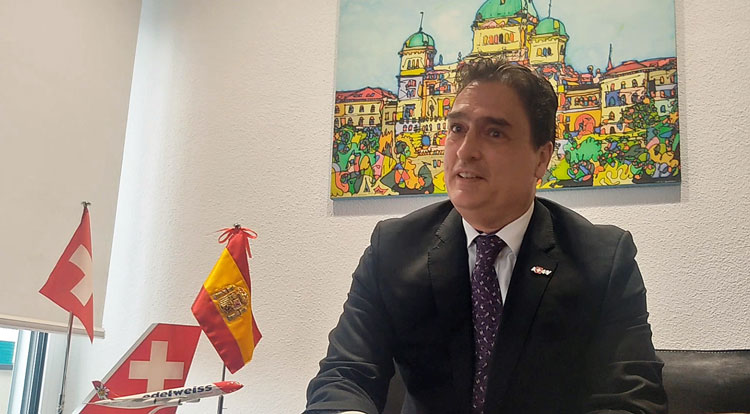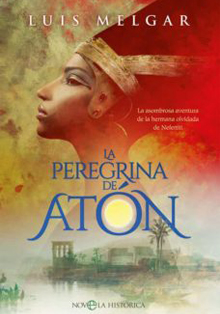Hanspeter Mock
Swiss ambassador in Madrid
Javier Socastro
Hanspeter Mock, the Swiss ambassador in Madrid, explains that what inspired him to follow the path of his grandfather, the Mexican ambassador Gilberto Bosques, were his conversations about the contribution that a public servant can make to a better “understanding between nations”. Despite finding the capital very changed since last time he came to Madrid, “what surprised me is that it seems to me that you breathe optimism despite the circumstances of the pandemic,” he declared during his interview for the YouTube channel by The Diplomat in Spain.
How has your diplomatic work in Spain been taking into account the pandemic situation?
For me it was an experience that I had never had. Coming to a country as the official representative of Switzerland and having to take my first steps in a context where contacts are more difficult, for obvious reasons, procedures take longer, and above all, freedom of movement is less.
To me, that implies more flexibility, more patience, more perseverance… Concepts that, in any case, are part of what can be expected of a diplomat.
Novartis and Roche are two pharmaceutical companies based in Switzerland that have invested in developing infected detection products, but have not dedicated themselves to developing a vaccine. Do you know the reason?
Large companies have their strategies. Novartis sold its vaccines division a few years ago, so it is not surprising that it is focusing more on other forms of prevention, but also treatment.
You also have to think about people already infected, how to cure them, the development of tests, etc. There, both companies are very present working in cooperation, and they are good examples of what can be done with multilateral cooperation at the scientific and pharmacological level between companies of different nationalities.
In fact, there are Swiss companies that also announced that they were going to make products available within the framework of international cooperation.
How have the commercial relations gone these months between Switzerland and Spain?
It just seems significant to me that today, in both senses, the number 1 product is medicines and pharmacological products. Switzerland exports a lot to Spain, but Spain also exports a lot to Switzerland, which indicates that we already have a fairly developed cooperation.
I return to the emphasis that I wanted to put on multilateral cooperation, not just bilateral, between countries. There is a vaccine, which I think is Moderna’s, which is manufactured in a plant located in Switzerland, then it is sent to Spain for packaging, and from there it is sent to Belgium where it is distributed throughout Europe.
It is a fact that seems anecdotal. However, that illustrates very well the importance of cooperating. I think this pandemic has shown us that this is the way: “work together.”
Switzerland has been, in the first half of 2020, the foreign country that has invested the most in Spain. Apart from the pharmaceutical sector, are there any other business fields that are particularly interesting for both countries?
First, thank you very much for mentioning this information because it is a source of pride and satisfaction for me. It may be a bit temporary, but it is true that in the first half of 2020, Switzerland was the first investor in Spain.
I do see the potential, especially in all sectors related to innovation. Everything that is computer science, communication science… But also, renewable energy industries, where there is a lot of experience in Switzerland and there is also in Spain. The fact that these issues are a priority for Spain also highlights our common interest in further cooperation.
Switzerland is not a very “normal” country since it is a semi-direct democracy where the average number of turnout per inhabitant in a year is around 4-5 times. In 2014, the Swiss population voted in favor of applying mobility restrictions within the Schengen area and the result was “YES” but today its border is still open for Europe, right?
Yes. I remember very well because I was working in the direction of European affairs at that time. It was a constitutional initiative called “Against Massive Immigration” that was intended to limit the flow of immigrants to Switzerland.
It must be stressed that Switzerland is a very open country. 25% of the total population is foreign. With regard to this referendum, when implementing the decision of the majority of the citizens, Parliament took special care to do so in a way that was not contradictory to the agreements with the European Union. Switzerland is truly integrated with the EU, and among other agreements we have an agreement on the free movement of workers. Therefore, an attempt was made to implement the new standard in legislation that does not contradict these agreements.
What was done was to apply incentives requiring companies that before resorting to labor that was not already in the Swiss labor market, they first give preference to those already in the market, regardless of their nationality. And so, it was done.
For this reason, Switzerland’s participation in the Schengen area, as well as the agreement on the free movement of persons, remains perfectly valid.
How is the work of an ambassador who represents such a democratic country, but at the same time less agile when it comes to decision making?
It feels good, but you are absolutely right. It must be recognized that this is not a system that especially favors innovative or progressive attitudes because decisions are made at the pace of the majority of citizens.
The downside is that sometimes we are not very fast. But the great advantage is that decisions in general enjoy an extremely high democratic level because the person who made the decision is the citizen. That gives the system a lot of stability.
What initiatives does Switzerland propose in its candidacy to become a non-permanent member of the United Nations Security Council for 2023-24?
It is an important campaign for us. We think that after 20 years of membership, it is time to take another step forward in our contribution to the multilateral system.
What this pin says here (ambassador Mock pointed to his jacket) is: “A Plus 4 Peace”, which is the motiv of our candidacy. This is what we hope to contribute. The strengthening of multilateralism, with special emphasis on issues related to peace and Human Rights.
Do you know if the Spanish government has supported your candidacy?
Given the importance of this candidacy for us, we obviously hope to be able to count on as many supporters as possible. Each member country of the United Nations has a voice and vote in this election and we especially have the support of close countries and friends such as Spain and Andorra.
To conclude, how has the work of cultural diplomacy been these months?
Cultural diplomacy and science diplomacy are closely linked. These are very important aspects because it is where human exchange is most perceptible.
Obviously, these months have been the peculiar ones due to the pandemic. But I prefer to look ahead and see the whole panorama of activities that we have. First of all, in April, we will have the departure of a sailboat called Fleur de Passion from the port of Seville. The curious fact is that this ship already left the port of Seville once to make a bypass around the world following the Magellan route. This time he is going to the Red Sea to do scientific research on corals.
We also have a magnificent exhibition on the calendar in Basel, at the headquarters of the Beyeler Foundation, in cooperation with the Prado Museum. This is going to be one of Goya’s main exhibitions outside of Spain, and in a way, it has been the answer to a very beautiful exhibition that was held a few years ago at the Prado Museum on the work of the Swiss Giacometti.
For me, it is important not only to promote what Swiss culture is in Spain, but also the other way around: in this way we strengthen our ties better, and there we have a very interesting cooperation with our colleagues from the Spanish embassy in Switzerland.






